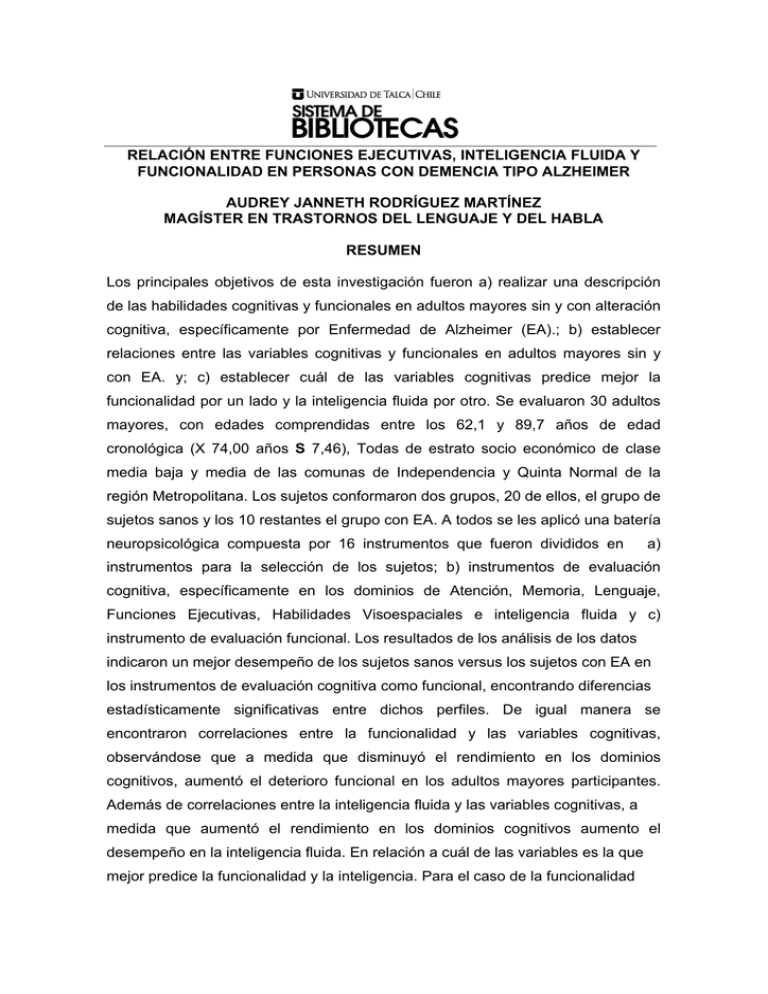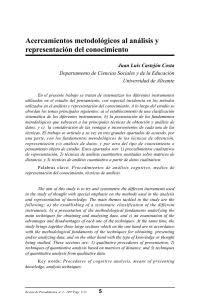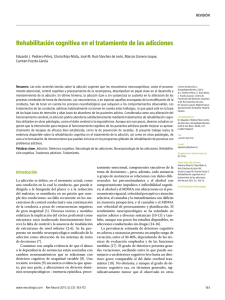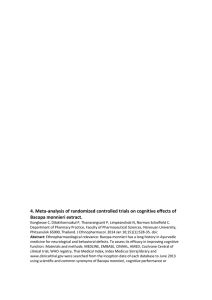relación entre funciones ejecutivas, inteligencia fluida y
Anuncio

RELACIÓN ENTRE FUNCIONES EJECUTIVAS, INTELIGENCIA FLUIDA Y FUNCIONALIDAD EN PERSONAS CON DEMENCIA TIPO ALZHEIMER AUDREY JANNETH RODRÍGUEZ MARTÍNEZ MAGÍSTER EN TRASTORNOS DEL LENGUAJE Y DEL HABLA RESUMEN Los principales objetivos de esta investigación fueron a) realizar una descripción de las habilidades cognitivas y funcionales en adultos mayores sin y con alteración cognitiva, específicamente por Enfermedad de Alzheimer (EA).; b) establecer relaciones entre las variables cognitivas y funcionales en adultos mayores sin y con EA. y; c) establecer cuál de las variables cognitivas predice mejor la funcionalidad por un lado y la inteligencia fluida por otro. Se evaluaron 30 adultos mayores, con edades comprendidas entre los 62,1 y 89,7 años de edad cronológica (X 74,00 años S 7,46), Todas de estrato socio económico de clase media baja y media de las comunas de Independencia y Quinta Normal de la región Metropolitana. Los sujetos conformaron dos grupos, 20 de ellos, el grupo de sujetos sanos y los 10 restantes el grupo con EA. A todos se les aplicó una batería neuropsicológica compuesta por 16 instrumentos que fueron divididos en a) instrumentos para la selección de los sujetos; b) instrumentos de evaluación cognitiva, específicamente en los dominios de Atención, Memoria, Lenguaje, Funciones Ejecutivas, Habilidades Visoespaciales e inteligencia fluida y c) instrumento de evaluación funcional. Los resultados de los análisis de los datos indicaron un mejor desempeño de los sujetos sanos versus los sujetos con EA en los instrumentos de evaluación cognitiva como funcional, encontrando diferencias estadísticamente significativas entre dichos perfiles. De igual manera se encontraron correlaciones entre la funcionalidad y las variables cognitivas, observándose que a medida que disminuyó el rendimiento en los dominios cognitivos, aumentó el deterioro funcional en los adultos mayores participantes. Además de correlaciones entre la inteligencia fluida y las variables cognitivas, a medida que aumentó el rendimiento en los dominios cognitivos aumento el desempeño en la inteligencia fluida. En relación a cuál de las variables es la que mejor predice la funcionalidad y la inteligencia. Para el caso de la funcionalidad resultaron ser la eficiencia cognitiva global, memoria episódica, habilidades de visconstrucción y lenguaje y para el caso de la variable inteligencia,eficiencia cognitiva global y memoria episódica. Estos hallazgos contribuyen a la evidencia que las medidas de la memoria episódica son útiles en la evaluación para descartar entre personas sanas y con EA, por una parte y por otra permiten realizar un seguimiento a los cambios cognitivos esperados en personas con EA Palabras claves: envejecimiento, memoria, inteligencia fluida, funcionalidad. ABSTRACT The main purposes of this research were a) to provide a description of the cognitive and functional abilities in older adults with and without cognitive impairment, specifically Alzheimer's disease (AD). ; b) to examine the relationships between cognitive and functional variables in older adults with and without AD,and; c) to study which of the cognitive variables predicts, on one hand, the functionality and, on the other hand, the fluid intelligence. We evaluated 30 elderly, aged between 62.1 and 89.7 years of chronological age (74.00 years ı S 7.46), all of them from lower-middle and middle class socioeconomic statusin the municipalities of Independencia and Quinta Normal in the Metropolitan Region. They formed two groups; 20 of them, the group of healthy subjects and the remaining 10were the AD group. All were administered a neuropsychological battery composed of 16 instruments thatwere divided into a) instruments for the selection of individuals; b) cognitive assessment instruments, specifically in the domains of attention, memory, language, executive functions, visuospatialskills and fluid intelligence, and c) functional assessment instrument. The data test resultsindicated a better performance of healthy individuals versus individuals with AD in both, cognitive and functional assessment instruments, finding statistically significant differences between thementioned groups. Similarly, correlations between functionality and cognitive variables were found, showing that as cognitive domains decreased performance, functional impairment increased in the elderly participants. In addition to correlations between fluid intelligence and cognitive variables, as performance in cognitive domains increased, performance on fluid intelligence increased as well. Regarding which of the variables best predicts functionality and intelligence. For the case of functionality, it turned to be the global cognitive efficiency, episodic memory, and language skills visoconstruccion and in the case of the intelligence variable it was the global cognitive efficiencyand the episodic memory. These findings contribute to the evidence that episodic memory measures are useful in the evaluation, as well as to discard between a healthy person and one with AD. Also,they allow us to track the expected cognitive changes in people with AD. Key words: aging, memory, fluent intelligence, functioning



